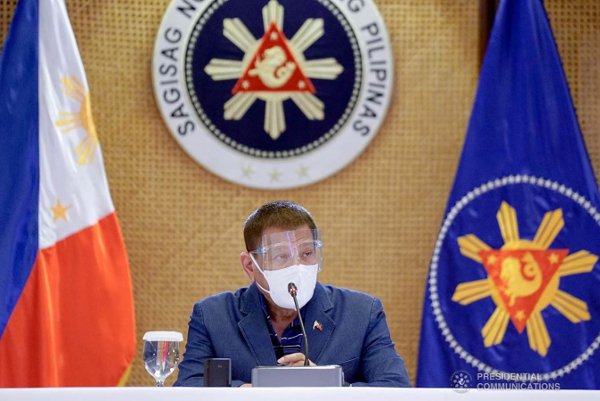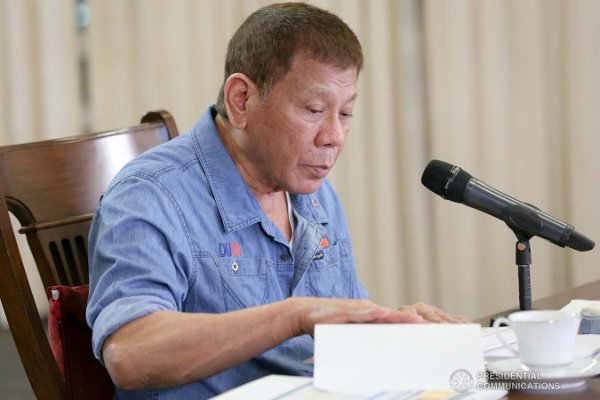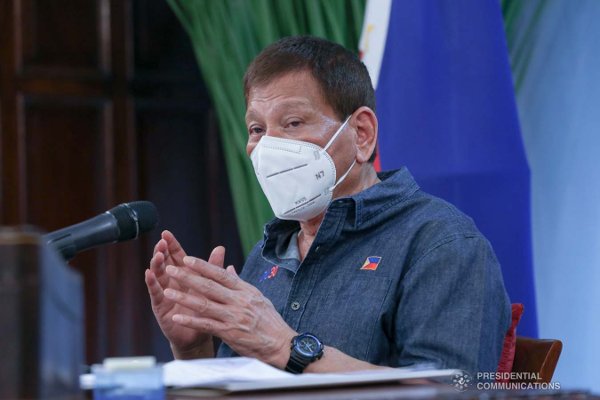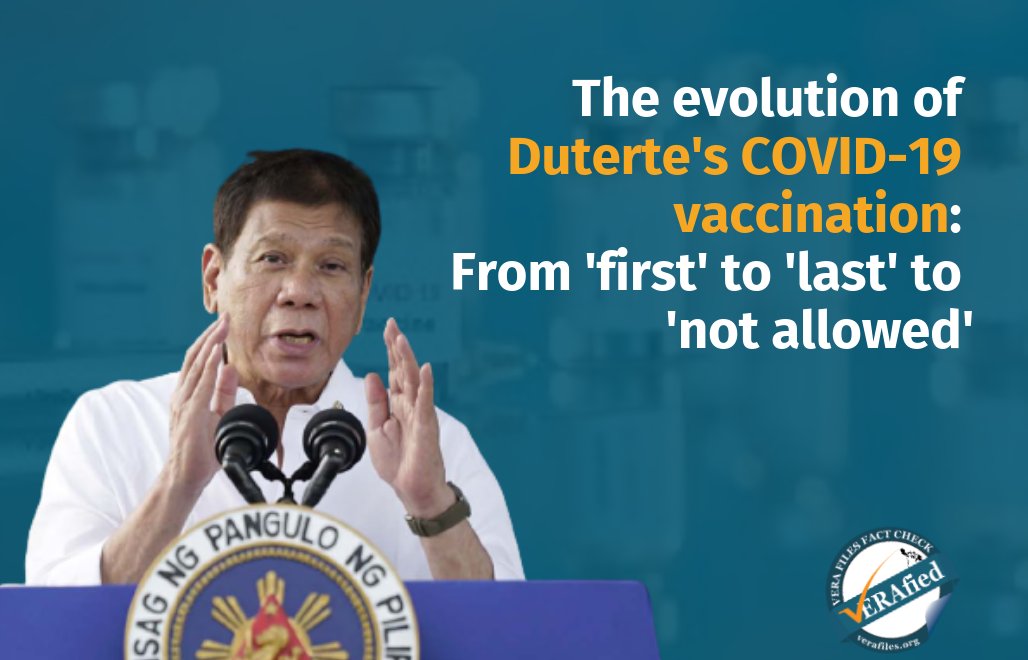President Rodrigo Duterte’s disclosure that “almost all” soldiers have been injected with the coronavirus disease 2019 (Covid-19) vaccine has placed military and Health officials in trouble. They’re now trying to mitigate the situation by coming up with alibis and excuses to make it appear that it was all right.
“Halos lahat ng sundalo natusukan na (Almost all soldiers have been injected). I have to be frank, and I have to tell the truth. I will not foist a lie,” Duterte said during a December 26 televised meeting on COVID-19 with key Cabinet officials and experts on emerging infectious diseases.
From “halos lahat (almost all),” the President shifted to “marami nang nagpatusok” (many have taken the shot), and then, he went on to say, “lahat (all), up to now, wala akong narinig pa (I have not heard yet) – for the select few – not all soldiers, not all soldiers, hindi pa kasi (because it’s not yet) policy,” apparently referring to the absence of side effects of the COVID vaccine.
More than the inconsistency in his numbers, it’s disturbing that the President does not seem to see anything wrong in having the soldiers injected with unregistered and apparently smuggled COVID vaccine.
Duterte, in fact, justified the immunization of the men in uniform ahead of other Filipinos, saying he did not want to have a sickly Armed Forces and police. “They have to be in good health all the time because they are responsible for the law and order of this country,” he added. He said they needed to be strong in fighting the communist rebels.
Health Undersecretary Maria Rosario Vergeire said the Department of Health (DoH) had no information about the soldiers’ vaccination. Col. Edgard Arevalo, the military spokesperson, said there had been no inoculations sanctioned by the Armed Forces leadership.
While the Armed Forces admitted that soldiers had been vaccinated, it refused to identify from which unit they were. Army chief Lt. Gen. Cirilito Sobejana said the number of soldiers vaccinated was not large. He also refused to say what brand of vaccine was administered.
Two days later, Interior Secretary Eduardo Año confirmed that the soldiers, who received the vaccine, were members of the Presidential Security Group (PSG). He added that some Cabinet members have also been given COVID vaccine shots but declined to name them, citing their right to privacy.
PSG Commander Brig. Gen. Jesus Durante defended the vaccination of PSG members, saying it was necessary to assure the security of the President. He even said the soldiers received the COVID vaccine as early as September.
To date, Sinopharm, the COVID vaccine that the president identified to have been given to the soldiers, has not applied for FDA approval even for emergency use.
The issue is not really why the President’s security escorts received the vaccine ahead of the others on the priority list but more about the breach in regulatory and safety protocols.
It is strange that Duterte made the disclosure just a few minutes after the meeting tackled the stringent regulatory process to ensure the efficacy and safety of the vaccines being developed by various countries.
Carlito Galvez Jr., chief implementer of the National Task Force on COVID-19 and concurrent presidential adviser on the peace process, assured Duterte during that meeting that the Philippines will follow the stringent qualification standards of the Asian Development Bank and World Bank in procuring COVIDQQ vaccines.
“To allay some fears of the public, Sir, we will follow the ADB-World Bank standards. We have 1.3 billion (pesos) that have been allocated by World Bank and ADB for the stringent qualification of every vaccine that will come here,” Galvez told Duterte.
He cited the ADB requirement that the vaccine has to be certified by the World Health Organization and has passed through stringent regulation from “either the US, UK, or other stringent countries.”
Further, Galvez said the World Bank has set higher standards: “either two or three SRAs (stringent regulatory authorities) at saka kailangan po talaga dumaan po sa vaccine expert panel po natin at saka po sa ating FDA bago po natin makuha (and must pass through a vaccine expert panel here and the FDA before we can get it.”
Are soldiers exempted from following those strict regulations?
At one point during the meeting, Duterte asked Food and Drug Administration (FDA) Director General Eric Domingo to go easy in certifying vaccines that have already passed through the strict regulations of the United States or the United Kingdom.
Domingo himself and the DoH appeared to be at a loss on how the vaccines administered to the PSG and some Cabinet officials were accessed. So far, no Covid-19 vaccine has been authorized for use in the country.
Domingo said the FDA had raided shops in Makati and Binondo that were rumored to be selling the vaccines underground but failed to apprehend any.
He had warned the public that unapproved vaccines exposed them to “all sorts of dangers” and that side effects were possible, “especially if you don’t know how these things have been handled.”
Under the FDA Act, those who import, sell, or distribute any unregistered health product may face the penalty of imprisonment or fines. Domingo said that while the law does not penalize the person injected with unregistered vaccines, charges await those who import, sell, distribute, and dispense these drugs.
Durante has quickly cleared Duterte of any liability, saying he was told about it after his close-in security had been vaccinated. The PSG chief also refused to confirm the president’s disclosure that the vaccine used was China’s Sinopharm, which has not applied for FDA approval.
So far, only Pfizer has applied for emergency use approval of its Covid-19 vaccine in the Philippines. Sinovac, Gamaleya, Johnson & Johnson’s Janssen and Clover’s late-stage trial applications have yet to be approved.
Health Secretary Francisco Duque III said the DoH was not consulted on the entry and use of the vaccines on the soldiers and Cabinet members. “Until now we are firm in our stand sa publiko na huwag kayo magpabakuna dahil wala pang rehistrado na bakuna (Do not get vaccinated because there are no registered vaccines yet),” he said in a media briefing.
Palace spokesman Harry Roque Jr. said the vaccines came from a donation. He said it was not a big deal, considering that the doses were mere “tokens.” However, FDA’s Domingo said even donated vaccines need to secure clearance from the DoH and FDA.
Donated drugs and food go through the DoH-Bureau of International Health Cooperation, which, in turn, coordinates with FDA for clearances.
In the case of the COVID-19 vaccines, this process was bypassed, and Malacañang and AFP officials have been tight-lipped about it.
On December 28, Roque said the public should just “accept” that uniformed personnel were among those already inoculated against the disease.
“Huwag ‘yo naman pong ipagkait sa ating mga sundalo kung nagkaroon sila ng proteksyon. Tanggapin na lang po natin na importante na iyong ating kasundaluhan, iyong mga nagbabantay sa ating seguridad, ay ligtas na sa COVID nang magampanan nila ang kanilang trabaho (Do not begrudge the soldiers for receiving the vaccine protection. Let us just accept that it’s important for our soldiers, who are in charge of our security, are safe from COVID so they can perform their duty),” he said.
The President’s disclosure, in which he invoked truth-telling, has raised numerous questions that roused the interest among his critics to investigate the underground use of COVID vaccine on soldiers and Cabinet officials.
The Senate would be spending time and money to find out how the unregistered vaccines landed into the country and ended up in the hands of the PSG. It should identify the persons accountable for the mess, and the result of the inquiry would hopefully lead to the filing of appropriate charges. Otherwise, it would be yet another case of wasteful spending.
The justifications and excuses cited by military leaders and Palace officials on the unlawful use of an unregulated vaccine were not only inconsistent but were also incredulous that one could say, “Tell that to the marines!”
The views in this column are those of the author and do not necessarily reflect the views of VERA Files.
This column also appeared in The Manila Times.



